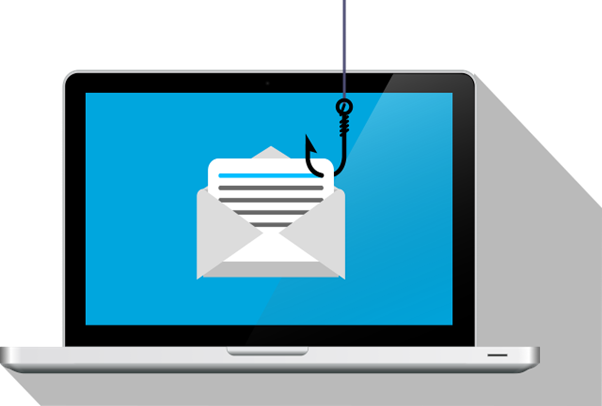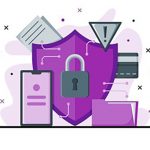
It’s not just Gmail, but when anything online is popular, with a lot of users, cybercriminals are going to target it. With over 1.5 billion global users, Gmail is not only the #1 email platform, but it also integrates with many other Google services, making it very enticing for hackers.
Cyber crooks usually seek entry to your system through email phishing attacks containing malicious links or attachments. As AI-powered hacking attacks become more common, it gets harder for people to distinguish between real and fake emails.
Many businesses use email domain names based on Gmail, they are as vulnerable as consumers. Both need to implement enhanced cybersecurity.
It’s crucial for Gmail users to be aware of new threats and take steps to keep their accounts safe. Let’s examine the new threats that Gmail users face in 2025 and offer some tips on how to protect yourself.
What are the risks of Gmail?
As cyber threats continue to evolve, some of the most sophisticated attempts have been aimed at Gmail. One major concern is that Artificial Intelligence (AI) is being used to create scam emails that appear very real. The purpose of these emails is to mimic real ones, making them difficult to spot. AI is also being used to create deepfakes and viruses, which complicates security even further.
Aside from the messages, address books and phishing scams, the critical aspect of Gmail is that it’s deeply connected to other Google services. This means if someone gains access to a user’s Gmail account, they might be able to access all of their digital assets. These include Google Drive, Google Pay, and saved passwords. This makes it even more critical for people to secure their Gmail accounts.
Using AI in phishing attacks allows hackers to analyze how people communicate, which helps them write to create more convincing emails that look almost exactly like real ones. This level of sophistication has made phishing efforts much more likely to succeed. Now, almost half of all phishing attempts use AI technology.
Even though Gmail continually updates its security, users still need to be adaptable to stay safe. We’ll delve into the specifics of these threats and explore how they work in the next part. Cyber threats are always changing, and Gmail users must stay vigilant to protect themselves. Next, we will explore what these threats mean for Gmail users and how they can impact both individuals and businesses.
What Do These New Threats Mean?
AI is used in these attacks to analyze and mimic the communication styles of trusted sources, such as banks or Google, making it difficult for people to identify fake emails because they often appear real and personalized. Gmail users are wise to be on guard.
What deepfakes and malware do:
Deepfakes and viruses created by AI are also becoming more prevalent.
If a hacker can capture your voice, often in a voice mail response, they can create deepfake fake audio or video messages that appear to come from people you know and trust (which complicates security more).
Malware that Is AI-generated is designed to evade detection by regular security tools.
How does this affect People and Businesses?
Two big risks for Gmail users are identity theft and financial fraud, but these threats have implications that extend beyond individual users. Businesses are also at risk. Compromised Gmail accounts can lead to data breaches and operational disruptions.
To better protect yourself, you need to be aware of these risks and take proactive steps to guard against them. The impact of these threats on both individuals and businesses can be disastrous – showing just how important cybersecurity is.
Additional Dangers:
More and more, zero-day exploits are being used to attack users. They exploit previously unknown security vulnerabilities in Gmail, allowing them to bypass traditional security measures. Attackers can access accounts without permission before Google can address the issue.
As if there wasn’t already enough to worry about, Quantum computing is also a huge threat to current encryption methods. As quantum computing advances, it may become possible to break complex passwords and encryption keys much more easily than before. This could make it easier for hackers to access Gmail accounts. Users should implement strong passwords, enable two-factor authentication, and regularly check account settings for suspicious activity.
How to make a Gmail email secure?
Gmail users face tons of security threats, but there are still things you can do to stay safe. Several steps can be taken to protect your Gmail account from these threats:
Create Strong Passwords!
Using a strong, unique password, that is NOT reused on other accounts helps avoid common, easily identified patterns. Using a Password Manager makes things easier, and usually include a password generator that not only creates strong passwords and keep them secure but also remembers them for you. Please take a look at our password tips HERE.
Use Two-Step Verification
Bolster your cybersecurity by establishing Two-Factor Authentication (2FA). It’s safer than a password because it requires a second form of verification, like a code sent to your phone or a physical security key. Attackers will have a much harder time accessing your account.
Monitor Any Third-Party Access
Keeping tabs on which apps and services can access your Gmail account is very important. You get messages like this on your phone when you install a new app: “Allow this app to access your camera.” Ask yourself why it would need that access. As a safety measure, remove any access that is no longer needed.
Gmail has an Advanced Protection Program: Use it!
The Advanced Protection Program Google offers will give you extra protection against scams and malware. It includes two-factor authentication and physical security keys. It also scrutinizes file downloads and app installations thoroughly. By following these steps, Gmail users can significantly reduce their risk of falling victim to these threats.
Protect Your Gmail Account
the threats to Gmail users are real, evolving, and getting more dangerous. Users can protect themselves by staying informed and implementing robust security measures. Never give up and be prepared to address new challenges as they arise.
Frequently Asked Questions
What is meant by the term "zero day"?
According to Kaspersky, “the term ‘zero-day’ refers to the fact that the vendor or developer has only just learned of the flaw – which means they have “zero days” to fix it. A zero-day attack takes place when hackers exploit the flaw before developers have a chance to address it. Zero-day is sometimes written as 0-day.”
What is the most unsafe password?
The worst password is also the world’s most common (for a few years in a row):
123456
Save this in the ‘Are you freaking kidding me?’ file. Sadly, we are not joking. This lame password takes less than a second to crack.
Which password manager is the best?
As with many things, it’s based on your particular needs, but 1Password, Bitwarden, Dashlane, Keeper, and NordPass are frequently cited as top contenders, each with unique strengths:
1Password offers a polished user experience and robust security.
Bitwarden stands out as an excellent free option.
Dashlane provides a full suite of security tools.
Keeper is also known for its strong security focus.
NordPass is praised for its encryption features and value.
What is the rarest 4-digit PIN?
The least commonly used 4-digit PIN (Personal Identification Number) is 8068, with just 25 occurrences out of 3.4 million PINs examined. With 10,000 possible combinations, this represents a minuscule frequency of just 0.000744%.
How secure is your network?
As a reputable member of the IT Support Los Angeles community since 2002, IT Support LA offers a FREE, no-risk network and cybersecurity assessment. It is a non-intrusive scan that allows us to deliver a comprehensive report that is yours to keep. No strings, and no obligation to ever use our Managed IT Services.
The best defenses are expert cybersecurity to protect your data from theft, and a top-notch Managed Services Provider (MSP) to ensure continued reliability and defenses against newly emerging threats.
With our 100% Money Back Guarantee in writing, we offer a risk-free way for prospective clients to try us out. Because we do not require a ‘hard’ contract, our clients can fire us at any time with 30 days’ notice. We have to be good.
Among the Managed IT services we provide:
IT HelpDesk Service
Onsite IT Support
Cybersecurity
Cloud migration and management
Email migration services
Backup and disaster recovery
VoIP phone systems
IT disposition and recycling
Office moves
White label services (IT to IT)
IT Support LA is an award-winning Managed Services Provider (MSP):
o 3 Years awarded Best IT by the Small Business Expo
o Awarded 2nd best company of any type in the US by the Small Business Expo SB100
o Awarded Best IT Support in California by Channel Futures
o Winner of Best IT in Los Angeles by Channel Futures
o Listed as one of the world’s Top 501 MSPs by CRN and in the top 250 in the ‘Pioneer’ listing
o 4 years listed as one of the Top 501 MSPs in the World by Channel Futures
o Listed as #21 MSP in the World in Channel Futures NextGen 101
o Globee 2021 Bronze Award winner for Chief Technology Officer of the Year
o Globee 2022 Gold Award winner for Chief Technology Officer of the Year
o Named one of 2022’s 50 ‘Best’ businesses in California by UpCity
o Named Best of IT winner by UpCity
o Winner of Local Excellence Award for 2021, 2022 and 2023 by UpCity
o Named Best of Cloud Consulting winner by UpCity
o Certified as Top Managed Services Providers and Cybersecurity Pro by UpCity
o Named Best IT in Los Angeles by Expertise.com.
Want Help Keeping your Email or Gmail safe?
Staying up to date on the latest security practices and best practices is important to keep your Email or Gmail account safe. In today’s cyber world, it’s crucial for both individuals and businesses to protect their digital assets. Don’t hesitate to reach out if you’d like help keeping your electronic communications private and secure, and also take advantage of our FREE no-risk network and cybersecurity assessment.
818-805-0909


